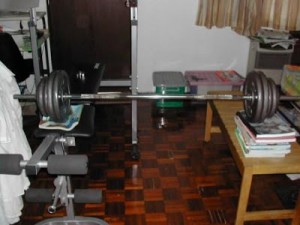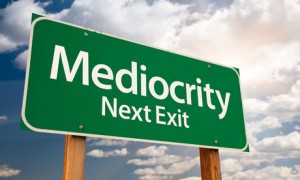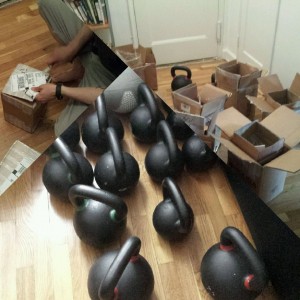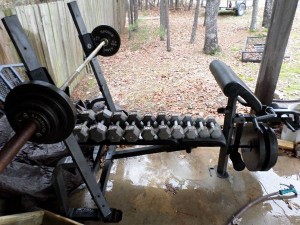We’re breaking up…
With the barbell.
To be honest, we had some really great times with the barbell… and we will always cherish those memories. I’ll always think back fondly — from the first time I got planted by 20 lbs on the bar (yes, this actually happened more than once) to the first time I picked up over 300 lbs. From the first time the whole gym stopped to watch Beth deadlift to the time our gym’s token juicehead muttered, “Oh dayum, she strong” while she crushed some rows.
The barbell really helped to make us who we are today — helped us to become better people physically, mentally, and emotionally.
But, it’s over.
To be fair, it’s nothing that the barbell did. We still love the barbell. And who knows. Maybe someday we’ll reunite. We wish it well, but the barbell just isn’t right for us right now.
Here’s why we broke up, what we learned, and how that relates to your goals and choices, in and out of the gym.
Logistics and proclivities rule decision making:
Part of our decision has to do with our proclivities: the gyms near us suck. The equipment sucks. The atmosphere sucks. The olfactory one-two punch of extreme human funk and Drakkar Noir sucks.
Part of our decision has to do with logistics: we live in New York City. And, at least for now, putting a rack, barbell, and plates in our apartment is not an option.
We dealt with the environment for a while, but it was always a ticking clock. In a way, the barbell was just collateral damage. If not for logistics and our proclivities we might have continued our love affair for much longer.
It’s easy to take on the “just suck it up and deal with it” mentality. And sometimes that’s absolutely called for. New training approaches and environments aren’t always comfortable, and constantly staying within your comfort zone is the fast-track to mediocrity.
But, if you’ve given it a fair shake and your situation is just untenable, it’s time to consider other options.
When considering your training choices, be honest with yourself about what you’re willing to deal with and what will make you miserable. Remember that a training method that is mostly right for you and that you do with 100% consistency is better than a method that is exactly perfect but that you do with 50% consistency.
Goals have a lifespan:
A goal attained is a goal lost… and one without goals is always lost.
We had rather typical, modest goals with the barbell. We attained them and had to consider where to set our sights next.
We’re not competitive athletes, we don’t plan to engage in any strength sports, and we don’t body-build in any traditional sense of the word. It was time to ask ourselves where we were going with the barbell. Certainly, as professionals we needed to spend time under the bar and gain competency with the primary lifts, but we already deadlift well over 1.5 and 2x bodyweight — do we really want or need 2 and 3x bodyweight deadlifts? Does the bench press belong in our programs at all? Are heavy power cleans appropriate? Are they worth the risk to the faces of those who constantly meander into our training space wearing Beats headphones and a day-old cologne-bath like a pair of douchebag merit badges?
Does the risk/reward ratio of the various barbell lifts make sense to us at this point?
Ask yourself if what you are doing is right for you. Are you doing something just because it’s currently popular? Are you doing it because it’s what other people do? Are you doing it because of some abstract training ideal? Are you doing it just because it’s what you used to do?
I’m all for experimentation, and if you really enjoy something that should weigh into your risk/reward calculation, but remember to consistently reassess:
Acknowledge where you are and consider the best routes to what you want. Then weigh that against your proclivities and logistics.
Don’t worry if your reassessment takes you somewhere unusual:
Between our proclivities, logistics, and goals we came up with what would have seemed like a crazy idea not so long ago: we’re breaking up with the barbell and are going to use kettlebells as our primary training tool for the next 6-12 months (which also allows us to work out without leaving the house).
We then did what any sane couple would do and bought 500 lbs of kettlebells.
So, to the obvious questions:
Why couldn’t we have just continued to use the barbell?
Well, we could have. It’s an awesome tool, but, as we mentioned, we don’t have tremendous barbell-oriented goals and the nearest barbells to us live in absolute shit-holes.
Why kettlebells?
We’ve been incorporating more and more kettlebell work into our training over the last couple of years and have seen the tremendous effects it can have on power, injury prevention, and conditioning. They also lend themselves to a different programming thought process, which should translate to us being better trainers and coaches for our clients. Those effects fit better with our current goals.
Why 6-12 months?
Because for us, at this point, the kettlebell is not just a tool, but also a goal unto itself. We don’t just want to workout with kettlebells. We want to own our kettlebell movements. Anything less than 6 months is not giving the kettlebell (or ourselves) a fair start. But 6 months also gives a point at which to reassess and determine if we made the right choice. (It is also, coincidentally, right around our honeymoon, during which there will be more sake than training. When placing milestones for your goals don’t try to force a square peg through a round hole.)
A goal requires commitment, but over-commitment is just as silly as under-commitment. What if it turns out we hate the kettlebell? Or vice versa? What if it doesn’t return as much to us when used as a primary training tool as when used as an accessory tool? What if we miss our old gym? What if it turns out all of our fitness improvements were fueled by a noxious cocktail of old gym socks and legionnaires? (A word of warning: don’t conflate not committing and avoiding over-commitment. We are the proud owners of over 500 lbs, approximately $800, of kettlebells, because that is a reasonable initial level of commitment.)
A built-in reassessment period is important when setting goals. It forces you to be honest with yourself about how your efforts (or lack thereof) are working. It also encourages you to stay the course on the bad days when you’re looking for something to blame.
So that’s the long and short of our decision. Consider who you are and who you want to be, where you are and where you want to be, and commit to the path that your assessments place you on. You might find it’s pretty far away from the path you’re on.







One comment
Comments are closed.